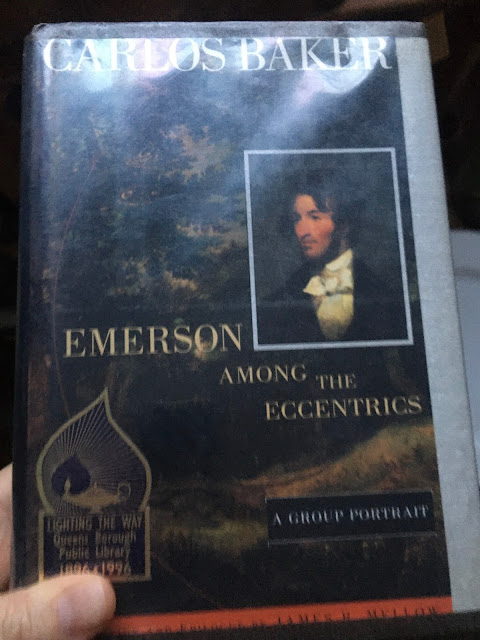Ralph Waldo Emerson (1803–1882) is at the center of this posthumous book that only lacked an introduction and an epilogue written by Princeton professor Carlos Baker. The Transcendental 2021 group recommended the book.
I find it amazing that Emerson opened up his first wife's casket after 13 months of her being buried. He doesn't say why he did it, or his impressions after he did it. What an odd thing to do. I'm not saying it might not have been instructive or useful or therapeutic. It must have been shocking a little.
Two of Emerson's working brothers were sickly, kept needing to get away from tubercular north east of America, and another brother was retarded and needed monitoring.
Emerson wasn't feeling the orthodoxy of his church. He did not find the eucharist, the eating and remembering Jesus to be something you're supposed to do, he just thought the disciples were meant to do it that one time. He had other qualms, and got himself sick with worrying about all these issues. He wanted to trust his own feelings about what he should believe, and not just parrot the orthodoxy to keep his job.
But how to get money? Turns out his first wife Ellen's estate was given to him, and that turned out to be where he got his money. At first he found it repugnant to get money from this source. Baker didn't go into his getting money.
What to do? Go to Italy of course. He thought a lot of his ideas for his book Nature, and was lonely at times, though he met some famous people.
He came back and changed Lidia's name to Lidian and married her, and moved to Concord.
I think Transcendentalism is about friendship for people who reject Puritanism and love nature. This is a wonderful book that looks at the people Emerson interacted with, his family, his circle of friends, and his various literary contacts. It is an interesting book often with words I had to look up, and not just in the mouth of people of the times, but by Baker who wrote an excellent book.
Quotes of Emerson recorded in Baker's book:
"The wise man must be wary of attaching followers. He must feel and teach that the best of wisdom cannot be communicated; must be acquired by every soul for itself. (p. 31)
"As soon as I read a wise sentence anywhere, I feel at once, the desire for appropriation" (P.32)
Links to background information and historical people:
Emerson's father death was complicated by TB, and siblings, first wife, sister-in-law, and children died of tuberculosis.
A short list of famous people who died from TB: John Keats, Percy Bysshe Shelley, and Edgar Allan Poe, the composer Frédéric Chopin, the playwright Anton Chekhov, the novelists Franz Kafka, Katherine Mansfield, Charlotte Brontë, Fyodor Dostoevsky, Thomas Mann, W. Somerset Maugham, George Orwell, and Robert Louis Stevenson, and the artists Alice Neel, Jean-Antoine Watteau, Elizabeth Siddal, Marie Bashkirtseff, Edvard Munch, Aubrey Beardsley and Amedeo Modigliani. Two of my favorite operas features heroins dying of TB: La Boheme and La Traviata.
Edward Thompson Taylor was a famous preacher Emerson went to see.
Germaine de Staël was a woman of letters and political theorist.
Family (Wikipedia)
Mary Moody Emerson: Aunt who lived with the family, father's sister, independent minded, quick witted, and 4 foot 5 inches tall.
William Emerson: Father
Ruth Haskins: Mother
9 Siblings: William, Edward, Robert Bulkeley, and Charles. Phebe, John Clarke, and Mary Caroline—died in childhood
Aunt: Sarah Bradford Ripley: Emerson worked at her school to make money in college.
First wife: Ellen Louisa Tucker
Lidian Jackson Emerson Second Wife
Transcendental Friends (The men seemed to be into sideburns)
Record of a School by Elizabeth Peabody.
Other Friends:
James Freeman Clarke friend of Fuller.
Anne Lynch Botta had a solon where Fuller met Poe
Fanny Kemble befriended Fuller.
Eliza Ware Farrar befriended Fuller.
Samuel Gray Ward who Married Anna Barker close friend of Fuller for quite some time.
Jones Very: Poet
Ellen Sewall: https://beforewalden.wordpress.com/ta...
Comments
Post a Comment